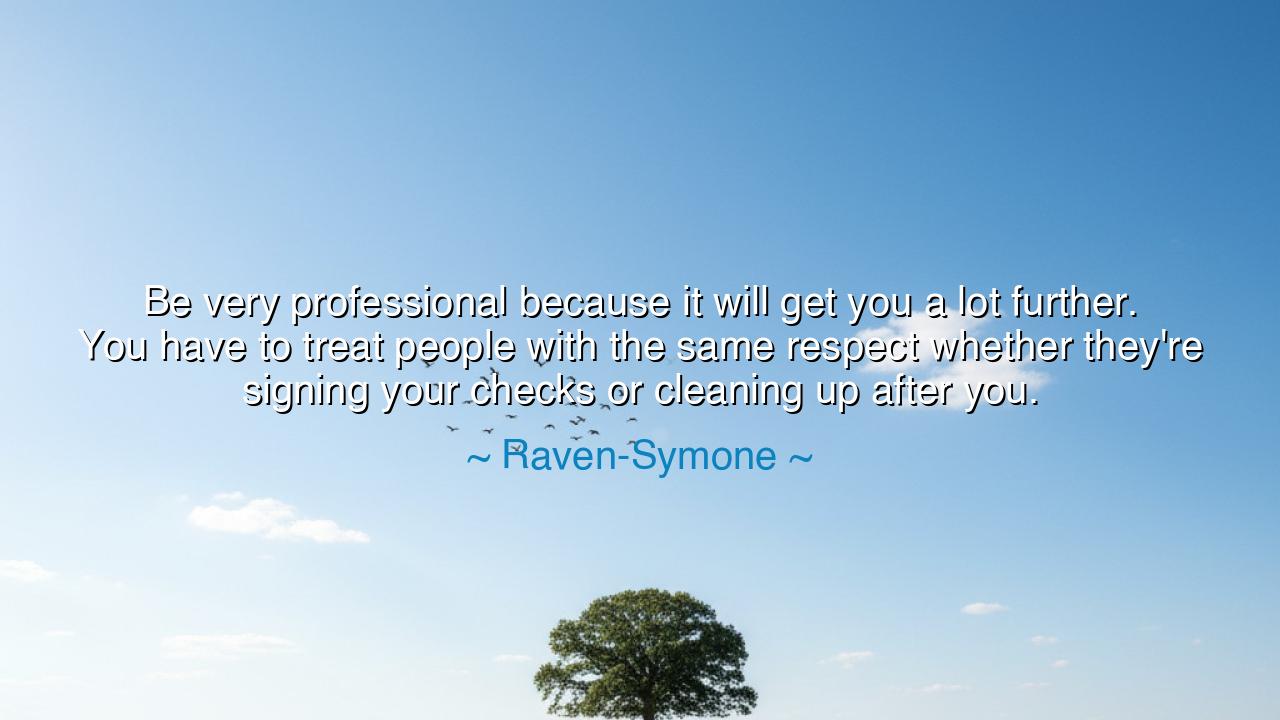
Be very professional because it will get you a lot further. You
Be very professional because it will get you a lot further. You have to treat people with the same respect whether they're signing your checks or cleaning up after you.






Hearken to the words of Raven-Symone, whose reflection illuminates the timeless path of virtue and conduct. She declares, “Be very professional because it will get you a lot further. You have to treat people with the same respect whether they're signing your checks or cleaning up after you.” In these words lies a profound truth: the measure of character is revealed not only in how we treat those who serve us, but in how we honor the dignity of every human being, regardless of station or status. True advancement flows from integrity, humility, and respect for all.
Since antiquity, philosophers and leaders have extolled the virtue of universal respect. In the halls of Athens, Socrates instructed that one’s moral fiber is tested not in grand victories but in everyday interactions—with merchants, servants, and peers alike. Raven-Symone’s words echo this ancient wisdom: advancement and success are not merely the product of talent or opportunity, but of consistent conduct grounded in respect and professionalism.
Consider the story of Marcus Aurelius, the Stoic emperor who ruled Rome with wisdom and discipline. Despite his immense power, he treated those beneath him with consideration and fairness, understanding that the well-being and respect of every citizen, servant, and soldier contributed to the strength of the empire. His professionalism and respect for all enabled him to govern effectively and left a legacy of moral authority that transcends time.
Symone emphasizes that professional conduct is a key to advancement: “it will get you a lot further.” This principle is mirrored in the experiences of artisans, scholars, and leaders throughout history. Those who combined skill with humility and courtesy earned trust, fostered collaboration, and created networks of support that propelled them forward. In contrast, arrogance or disdain toward others often hindered progress, eroding alliances and reputations.
The reflection also underscores an ethical truth: respect is not conditional. Whether one interacts with a patron who signs a check or a laborer who cleans the space around them, conduct must remain consistent. Ancient texts, from the Torah to Confucian writings, teach that the moral worth of an individual is not determined by wealth or rank, and that the treatment of the lowliest among us reflects the integrity of the highest. Symone’s words remind us that fairness and respect are foundational to professional and personal success.
The moral lesson emerges clearly: conduct yourself with professionalism, dignity, and respect for all. Advancement that ignores ethics is fleeting, but progress rooted in integrity endures. Symone teaches that how we treat others, especially those with less power, shapes reputation, influence, and the ultimate measure of achievement.
Practical guidance flows naturally: in every interaction, speak with courtesy, act with consideration, and honor the dignity of all participants. Whether negotiating with leaders, collaborating with colleagues, or encountering those whose work is unseen, maintain consistent respect and professionalism. In doing so, one cultivates trust, builds alliances, and creates the conditions for enduring success.
Thus, heed the wisdom of Raven-Symone: professionalism and respect for all are not mere etiquette—they are the pillars of lasting advancement and moral authority. Treat every person with dignity, regardless of their role, and let integrity guide your path. In this manner, you honor both yourself and those around you, forging a legacy of respect, success, and ethical leadership that endures across generations.






AAdministratorAdministrator
Welcome, honored guests. Please leave a comment, we will respond soon